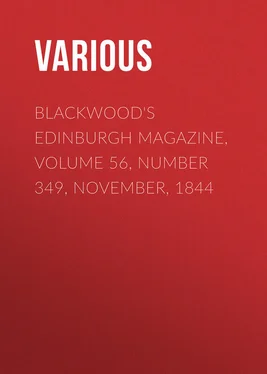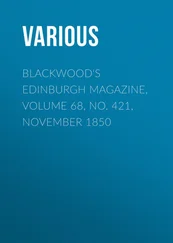Various - Blackwood's Edinburgh Magazine, Volume 56, Number 349, November, 1844
Здесь есть возможность читать онлайн «Various - Blackwood's Edinburgh Magazine, Volume 56, Number 349, November, 1844» — ознакомительный отрывок электронной книги совершенно бесплатно, а после прочтения отрывка купить полную версию. В некоторых случаях можно слушать аудио, скачать через торрент в формате fb2 и присутствует краткое содержание. Издательство: Иностранный паблик, Жанр: periodic, foreign_edu, Путешествия и география, на английском языке. Описание произведения, (предисловие) а так же отзывы посетителей доступны на портале библиотеки ЛибКат.
- Название:Blackwood's Edinburgh Magazine, Volume 56, Number 349, November, 1844
- Автор:
- Издательство:Иностранный паблик
- Жанр:
- Год:неизвестен
- ISBN:нет данных
- Рейтинг книги:4 / 5. Голосов: 1
-
Избранное:Добавить в избранное
- Отзывы:
-
Ваша оценка:
- 80
- 1
- 2
- 3
- 4
- 5
Blackwood's Edinburgh Magazine, Volume 56, Number 349, November, 1844: краткое содержание, описание и аннотация
Предлагаем к чтению аннотацию, описание, краткое содержание или предисловие (зависит от того, что написал сам автор книги «Blackwood's Edinburgh Magazine, Volume 56, Number 349, November, 1844»). Если вы не нашли необходимую информацию о книге — напишите в комментариях, мы постараемся отыскать её.
Blackwood's Edinburgh Magazine, Volume 56, Number 349, November, 1844 — читать онлайн ознакомительный отрывок
Ниже представлен текст книги, разбитый по страницам. Система сохранения места последней прочитанной страницы, позволяет с удобством читать онлайн бесплатно книгу «Blackwood's Edinburgh Magazine, Volume 56, Number 349, November, 1844», без необходимости каждый раз заново искать на чём Вы остановились. Поставьте закладку, и сможете в любой момент перейти на страницу, на которой закончили чтение.
Интервал:
Закладка:
Question I. – "Are all, or any, and if any, which of the counts of the indictment, bad in law – so that, if such count or counts stood alone in the indictment, no judgment against the defendants could properly be entered upon them?"
Question II. – "Is there any, and if any, what defect in the findings of the jury upon the trial of the said indictment, or in the entering of such findings?"
Question III. – "Is there any sufficient ground for reversing the judgment , by reason of any defect in the indictment, or of the findings, or entering of the findings, of the jury, upon the said indictment?"
Question XI. – "In an indictment consisting of counts A, B, C, when the verdict is, guilty of all generally , and the counts A and B are good, and the count C is bad; the judgment being, that the defendant, ' for his offences aforesaid ,' be fined and imprisoned; which judgment would be sufficient in point of law, if confined expressly to counts A and B – can such judgment be reversed on a writ of error? Will it make any difference whether the punishment be discretionary, as above suggested, or a punishment fixed by law?"
The above questions may be stated shortly and substantially thus: – Are there any defective counts in the indictment? Any defective findings of the jury? Any defects in entering the findings? Can judgment be reversed on any of these grounds? If one only of several counts in an indictment be bad; a verdict given of "guilty" generally; judgment awarded against the defendant "for his offences aforesaid," and the punishment discretionary – can judgment be reversed on a writ of error? The whole matter may now, in fact, be reduced to this single question: Can a judgment inflicting fine or imprisonment be reversed by a court of error, because that judgment proceeded on an indictment containing both bad and good counts, and in respect of which some of the findings of the jury were either defective or defectively entered? – Let us now listen to the decision of that venerable body of men, who are, in the language of our great commentator, " the depositaries of the laws, the living oracles, who must decide in all cases of doubt, and who are bound by an oath to decide according to the law of the land. " 8 8 1 Blackstone's Commentaries, p. 69.
The questions which they had thus to consider, moreover, were not questions of rare, subtle, unusual, and speculative, but of an ordinary practical character, such as they were concerned with every day of their lives in administering the criminal law of the country.
First, then, were there any bad counts in the indictment?
The judges were unanimously of opinion that two of the counts were bad, or insufficient in law – and two only – which were the sixth and seventh counts. They hold positively and explicitly, that the remaining nine counts were perfectly valid.
The Chief-Justice (Tindal) thus delivered this unanimous opinion of himself and his brethren on this point. 9 9 Opinions of the Judges, &c. – (Pp. 1-3.)
"No serious objection appears to have been made by counsel for the prisoners, against the sufficiency of any of the counts prior to the sixth. Indeed, there can be no question that the charges contained in the first five counts, do amount in each to the legal offence of conspiracy, and are sufficiently described therein .
"We all concur in opinion as to the eighth, ninth, and tenth counts, (no doubt whatever having been raised as to the sufficiency of the eleventh count,) that the object and purpose of the agreement entered into by the defendants and others, as disclosed upon those counts, is an agreement for the performance of an act, and the attainment of an object, which is a violation of the law of the land."
With reference to the sixth and seventh counts, in the form in which they stand upon their record, the judges were unanimously of opinion, that these counts "did not state the illegal purpose and design of the agreement entered into between the defendants, with such proper and sufficient certainty as to lead to the necessary conclusion that it was an agreement to do an act in violation of the law." They did not show what sort of fear was intended by the alleged intimidation, nor upon whom it was intended to operate, nor was it alleged that the "physical force exhibited" was to be used , or intended to be used.
Observed, therefore, on what grounds these two counts – two only out of eleven – are held defective: they are deficient in that rigorous " certainty " now held requisite to constitute a perfectly legal charge of crime. To the eye of plain common sense – we submit, with the deepest deference, to those who have held otherwise – they distinctly disclose a corpus delicti ; but when stretched upon the agonizing rack of legal logic to which they were exposed, it seems that they gave way. The degree of "certainty" here insisted upon, would seem to savour a little (possibly) of that nimia subtilitas quæ in jure reprobatur; et talis certitudo certitudinem confundit : and which, in the shape of "certainty to a certain intent in every particular," is rejected in law, according to Lord Coke, (5 Rep. 121.) It undoubtedly tends to impose inevitable difficulty upon the administration of criminal justice. Sir Matthew Hale complained strongly of this "strictness, which has grown to be a blemish and inconvenience in the law, and the administration thereof; for that more offenders escape by the over-easy ear given to exceptions in indictments, than by their own innocence." – 12 Hal. P. C. 193; 4 Bla. Co. 376. The words, in the present case, are pregnant with irresistible "inference" of guilt; an additional word or two, which to us appear already implicitly there, as they are actually in the eleventh count, would have dispersed every possible film of doubt; and Lord Brougham, in giving judgment, appeared to be of this opinion. But now for the general result: The indictment contained two imperfect counts, and nine perfect counts, distinctly disclosing offences not very far short of treason.
Thus, then, the first question was answered.
To the second question the judges replied unanimously, "that the findings of the jury in the first four counts were not authorized by the law, and are incorrectly entered on the record." One of the judges, however, and a most eminent judge, (Mr Justice Patteson,) being of a contrary opinion.
Thus we have it unanimously decided by the judges, whose decision was acquiesced in by the House of Lords, that there were two bad counts, (the 6th and 7th,) on which there were good findings by the jury, and, with the exception of Mr Justice Patteson, four good counts, (the 1st, 2d, 3d, and 4th,) on which there were bad findings. The effect of this twofold error was thus tersely stated by Mr Baron Gurney, and adopted by the Lord Chancellor. 10 10 Opinions of the Judges, p. 23.
"I cannot distinguish between a bad finding on a good count, and a good finding on a bad count. They appear to me to amount to precisely the same thing – namely, that upon which no judgment can be pronounced. The judgment must be taken to have proceeded upon the concurrence of good counts and good findings , and upon nothing else."
Here, then, at length, it seems that we have hit upon a blot – a petty, circumscribed blot to be sure, upon a vast surface of otherwise unsullied legal sufficiency; but still – in the opinion of the judges – a blot.
What was to be held the effect of it? Or had it any effect?
The traversers' counsel, at the bar of the House of Lords, took by surprise every one whom they addressed – all their opponents, all the judges, all the law lords, and all the legal profession, as soon as they had heard of it – by boldly affirming, that if this blot really existed, it would invalidate and utterly nullify the whole proceedings from the beginning to the end! They hammered away at this point accordingly, hour after hour – day after day – with desperate pertinacity; being compelled from time to time, during their hopeful argument, to admit, that up to that moment the rule or custom which they were seeking to impeach had been universally acted upon from time immemorial, to the contrary of that for which they were contending. This strange and novel point of theirs gave rise to the third and eleventh questions put to the judges. These questions are substantially identical, viz., whether a single bad count in an indictment on which there has been a general verdict of guilty, with judgment accordingly, will entitle the fortunate defendant to a reversal of that judgment?
Читать дальшеИнтервал:
Закладка:
Похожие книги на «Blackwood's Edinburgh Magazine, Volume 56, Number 349, November, 1844»
Представляем Вашему вниманию похожие книги на «Blackwood's Edinburgh Magazine, Volume 56, Number 349, November, 1844» списком для выбора. Мы отобрали схожую по названию и смыслу литературу в надежде предоставить читателям больше вариантов отыскать новые, интересные, ещё непрочитанные произведения.
Обсуждение, отзывы о книге «Blackwood's Edinburgh Magazine, Volume 56, Number 349, November, 1844» и просто собственные мнения читателей. Оставьте ваши комментарии, напишите, что Вы думаете о произведении, его смысле или главных героях. Укажите что конкретно понравилось, а что нет, и почему Вы так считаете.












